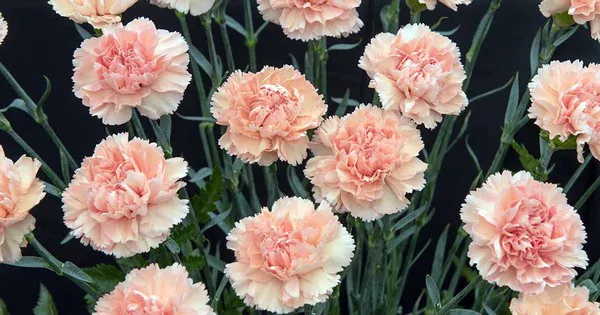Carnation flowers, scientifically known as Dianthus caryophyllus, have been cherished for centuries, not only for their captivating beauty but also for their multifaceted uses across various domains. Often associated with love, fascination, and distinction, carnations have found a place in cultural, culinary, medicinal, and ornamental spheres. In this comprehensive exploration, we delve into the diverse applications of carnation flowers, unraveling their significance and impact on different aspects of human life.
Historical Significance and Symbolism
The history of carnation flowers dates back to ancient times, with their origins rooted in the Mediterranean region. Greeks and Romans revered these blossoms, associating them with the divine. The name “carnation” is believed to have been derived from the Latin word “corone” or “coronation,” reflecting the flowers’ use in ceremonial crowns. Over the centuries, carnations have symbolized love, fascination, and distinction, making them a popular choice for expressing various emotions.
Culinary Delights: Carnations in the Kitchen
Beyond their aesthetic appeal, carnations have made their mark in the culinary world. The petals of these flowers are edible and are often used to garnish salads, desserts, and beverages. Their subtle, slightly spicy flavor adds a unique twist to both sweet and savory dishes. In some cultures, carnations are infused into syrups, jams, and liqueurs, creating delicacies that not only please the palate but also showcase the versatility of these blooms in gastronomy.
Medicinal Marvels: Carnations in Traditional Medicine
Carnation flowers have also found a place in traditional medicine, owing to their potential health benefits. Rich in phytochemicals, carnations are believed to possess antioxidant, anti-inflammatory, and antimicrobial properties. Extracts from carnation petals have been used in various traditional remedies to alleviate digestive issues, soothe skin conditions, and even promote respiratory health. As we delve into the scientific validation of these claims, the medicinal potential of carnation flowers becomes a captivating subject for further exploration.
Aromatic Allure: Carnations in Perfumery
The enchanting fragrance of carnation flowers has made them a prized ingredient in the world of perfumery. The essential oil extracted from carnation petals is used as a base or middle note in perfumes, adding a warm, spicy, and floral dimension to fragrance compositions. The timeless appeal of carnation-scented perfumes has endured through the ages, making them a classic choice for those who appreciate the delicate yet enduring essence of these blooms.
Artistic Expression: Carnations in Arts and Crafts
Carnation flowers have inspired artists and crafters alike, serving as a muse for creative expression. From paintings and sculptures to intricate floral arrangements, carnations have been a recurring motif in art throughout history. Their varied colors and distinctive fringed petals provide artists with a rich palette to convey emotions, symbolize concepts, or simply capture the beauty of nature. In the realm of crafts, dried carnation petals are often used in potpourri, sachets, and handmade paper, adding a touch of elegance and nostalgia to artisanal creations.
Gardening and Landscape Design: Cultivating Carnations
For avid gardeners and landscape designers, carnation flowers offer an array of options to enhance outdoor spaces. With a wide spectrum of colors, including vibrant reds, pinks, whites, and yellows, carnations can be incorporated into garden beds, borders, and containers. Their resilience and adaptability make them suitable for various climates, and with proper care, they can bloom prolifically, providing a stunning visual display. Understanding the nuances of cultivating carnations becomes essential for those seeking to add these timeless blossoms to their gardens.
Carnations in Events and Celebrations: Symbolizing Love and Appreciation
The enduring symbolism of carnations, particularly in the realm of emotions, has made them a popular choice for events and celebrations. From weddings and anniversaries to Mother’s Day and graduations, carnations are often selected to convey messages of love, admiration, and congratulations. The choice of color holds significance, with red carnations symbolizing deep love, pink representing gratitude, and white signifying purity and luck. Exploring the cultural and emotional significance attached to carnations in various celebrations provides a glimpse into the enduring appeal of these flowers in human relationships.
Environmental Impact: Sustainable Practices in Carnation Cultivation
As the demand for carnations continues to grow, it becomes imperative to explore sustainable practices in their cultivation. Issues such as pesticide use, water consumption, and waste management in the flower industry raise important questions about the environmental impact of carnation farming. The emergence of eco-friendly initiatives, organic cultivation methods, and fair trade practices sheds light on the industry’s efforts to address these concerns. Understanding the environmental implications of carnation cultivation allows consumers to make informed choices, supporting sustainable practices that prioritize both the beauty of the flowers and the health of the planet.
Conclusion
In conclusion, carnation flowers stand as a testament to the enduring relationship between humans and the natural world. Their journey from ancient ceremonial crowns to modern culinary delights and medicinal applications showcases the versatility and significance of these blooms. Whether adorning gardens, gracing celebratory events, or inspiring artistic creations, carnations continue to captivate hearts and minds across diverse domains. As we unlock the allure of carnation flowers, we find a timeless beauty that transcends cultural, culinary, medicinal, and ornamental boundaries, enriching our lives in myriad ways.


